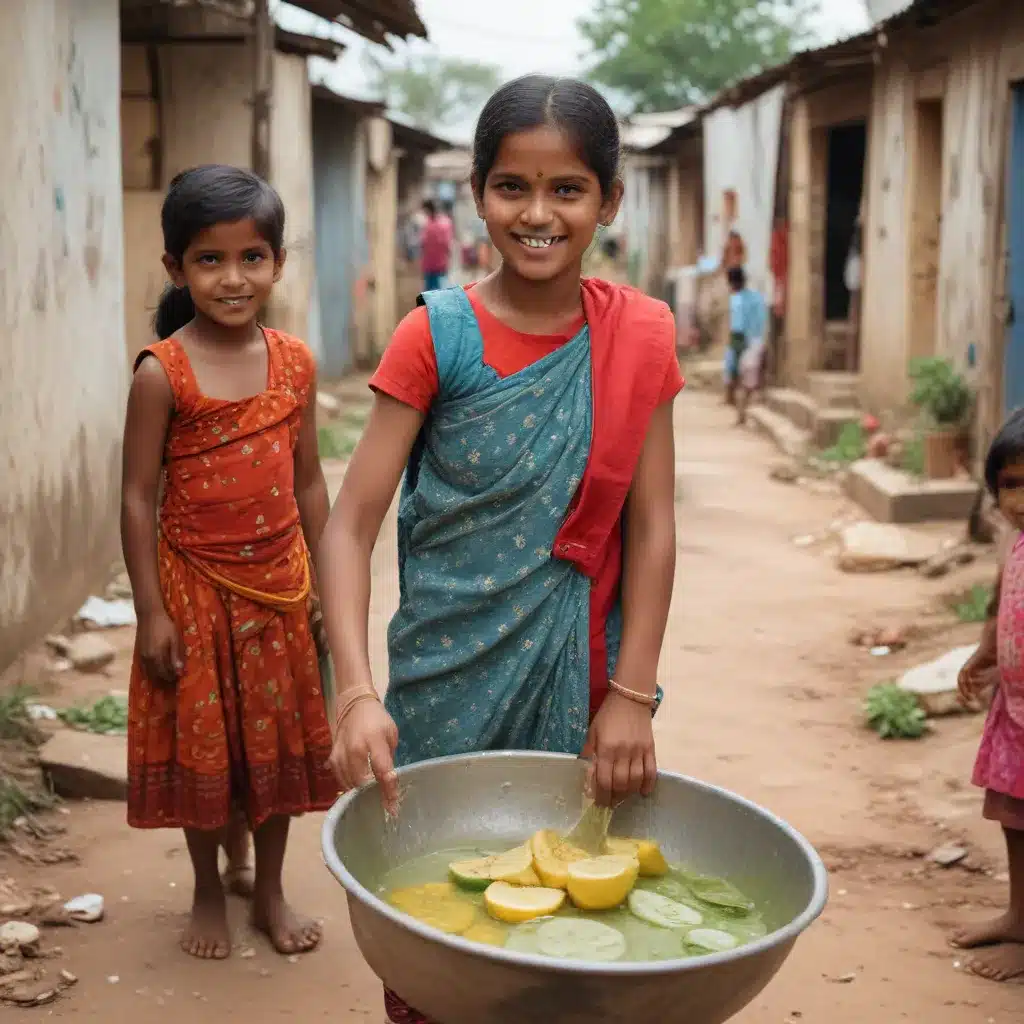
The Urgent Need for Integrated Approaches
Informal settlements, also known as slums, are home to millions of children and families across the developing world. In Hyderabad, India, these vibrant yet underserved communities face a multitude of intersecting challenges that undermine child health and wellbeing. Inadequate access to safe water, sanitation, and hygiene (WASH) services, coupled with poor nutrition and limited healthcare, create a perfect storm of risk factors that perpetuate the cycle of poverty and poor health outcomes.
The stakes are high. Children living in informal settlements are disproportionately affected by preventable diseases like diarrhea, stunting, and wasting – conditions that not only compromise their immediate health, but also have lifelong impacts on cognitive development, educational attainment, and future productivity. Addressing these interconnected issues through siloed, single-sector approaches is simply not enough.
What’s needed is a holistic, community-driven strategy that recognizes the inextricable links between WASH, health, and nutrition. By aligning efforts across these domains and empowering local stakeholders, we can unlock tremendous potential to transform the lives of Hyderabad’s most vulnerable children. The Joint Action for Water blog is proud to share insights from the field on how to put this vision into practice.
Strengthening WASH Infrastructure and Behaviors
Reliable access to safe water, adequate sanitation, and good hygiene practices form the foundation for child health and nutrition. Yet in Hyderabad’s informal settlements, these basic services remain elusive for many households. Open defecation, lack of handwashing facilities, and contaminated water sources create pathways for the spread of infectious diseases that undermine child growth and development.
To address this challenge, community-led initiatives have proven highly effective. Through participatory approaches that engage residents in the design and management of WASH infrastructure, we can ensure solutions are culturally appropriate and responsive to local needs. For example, the Habitat for Humanity program in Hyderabad has empowered community members to construct shared sanitation facilities, establish waste management systems, and promote handwashing behaviors – all while strengthening a sense of ownership and collective responsibility.
Complementing these physical upgrades, targeted behavior change campaigns can cultivate sustained improvements in hygiene practices. By leveraging trusted community networks, popular media, and interactive educational activities, we can motivate parents and caregivers to adopt key behaviors like handwashing, safe water storage, and proper disposal of infant and child feces. The CLTS (Community-Led Total Sanitation) approach, for instance, has demonstrated success in catalyzing collective action to eliminate open defecation in informal settlements across India.
Integrating WASH, Health, and Nutrition Services
While robust WASH infrastructure and behaviors are essential, their impact on child wellbeing is maximized when combined with comprehensive healthcare and nutrition support. Diarrheal diseases, for example, not only stem from poor WASH conditions, but also deprive the body of essential nutrients, further compromising immune function and growth.
Leveraging the synergies between these domains requires intentional coordination and integration of service delivery. Community health workers can play a pivotal role, serving as a bridge between households, WASH providers, and primary care facilities. By equipping these frontline workers with the knowledge and skills to holistically address WASH, health, and nutrition, we empower them to identify and manage complex, interrelated issues that undermine child wellbeing.
Innovative models like the Partnership for Maternal, Newborn and Child Health (PAMANECH) program in Nairobi’s informal settlements have demonstrated the power of this approach. By training community health workers on integrated service delivery, strengthening linkages between formal and informal providers, and empowering residents to advocate for their needs, PAMANECH has achieved significant improvements in maternal and child health outcomes.
Catalyzing Community Ownership and Advocacy
Sustainable progress in Hyderabad’s informal settlements will not come from top-down, externally driven initiatives alone. Rather, it requires a profound shift in power dynamics, wherein residents – especially women, youth, and marginalized groups – are positioned as the central protagonists in shaping their own health and development trajectories.
Community-based organizations, self-help groups, and informal networks possess invaluable knowledge of local challenges, resources, and cultural nuances. By elevating these grassroots voices and amplifying their advocacy efforts, we can ensure that WASH, health, and nutrition interventions are truly responsive to community needs. The UN-Habitat’s World Cities Report 2020 highlights several inspiring examples of community-driven initiatives that have transformed informal settlements through collective action and civic engagement.
At the same time, strengthening linkages between informal community structures and formal service providers is crucial. Government agencies, NGOs, and private sector actors must learn to see residents as partners, not passive beneficiaries. By co-creating solutions, sharing decision-making power, and investing in community leadership, we can cultivate a shared sense of ownership that sustains long-term improvements in child wellbeing.
A Path Forward: Leveraging Intersectoral Collaboration
Addressing the intersection of WASH, health, and nutrition to uplift children in Hyderabad’s informal settlements will require a coordinated, multifaceted approach. Key elements of this strategy include:
-
Strengthening WASH Infrastructure and Behaviors: Empower communities to design, implement, and maintain contextually appropriate WASH solutions while driving sustained improvements in hygiene practices.
-
Integrating Service Delivery: Ensure seamless coordination between WASH, health, and nutrition providers, leveraging community health workers as catalysts for holistic care.
-
Fostering Community Ownership and Advocacy: Elevate resident voices, especially from marginalized groups, and build their capacity to shape local policies and service delivery.
-
Cultivating Intersectoral Collaboration: Forge strategic partnerships between government, civil society, and the private sector to pool resources, share knowledge, and achieve greater impact at scale.
By embracing this holistic, community-driven model, we can unleash the transformative potential of Hyderabad’s informal settlements. Together, we can create a future where every child has the opportunity to thrive, free from the constraints of poverty, poor health, and malnutrition. The Joint Action for Water blog is committed to amplifying these stories of change and inspiring others to join the movement.

